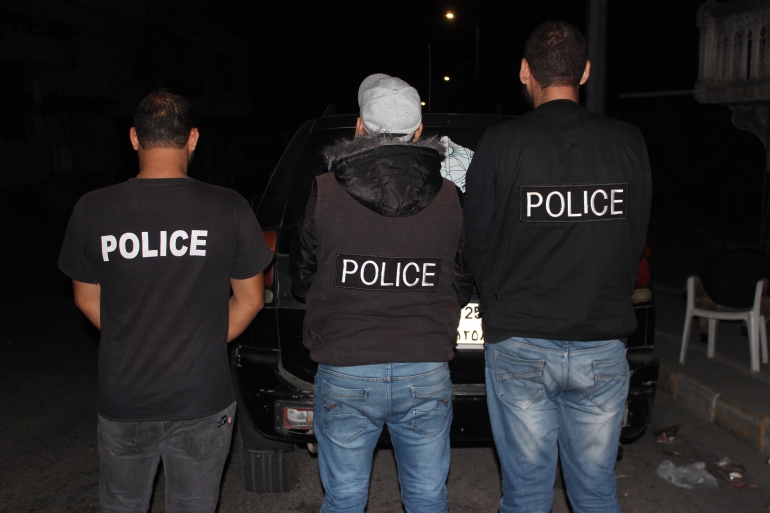Walid, Maher and Abdullah are proud to be part of Halba’s town protectors [Jacob Boswall/Al Jazeera] Listen to this story:
Akkar, Lebanon – At 11pm on a mild October night, headlights from five SUVs pierce through the darkness in Halba, the capital of Akkar – Lebanon’s rugged, northernmost governorate.
More than a dozen young men mill about, trading jokes and smoking cigarettes in matching camouflage hunting jackets. Some are municipal police, but most are volunteers with Halba’s “ haras al-baladiyeh”, or town protectors. Together, they keep a nightly vigil over the slumbering provincial town, on the lookout for trouble.
“Jump in boys,” says Maher Khaled el-Ali, a chatty 38-year-old town protector, motioning to a black SUV marked “Halba Municipality”. Also joining Maher are two 20-something colleagues: Walid, a stocky local mechanic, and the imposing, powerfully built Abdullah Abdelwahab Hammoud.
The vehicle springs to life and takes off into Halba’s deserted urban sprawl. After two minutes, it abruptly stops. Maher and his two fellow town protectors go to the boot without explanation.
The trio reappears with white plastic chairs, which they neatly line up on the sidewalk. The chosen spot lies on the main road through town, surrounded by drab, low-rise apartment buildings – with barely a light on inside. Only cicadas and the occasional passing car break the silence.
The Saturday night “doriyyeh” or security patrol has begun. Abdullah, Maher and Walid on patrol at one of Halba’s eastern entrances [Jacob Boswall/Al Jazeera] For many years, town protectors have operated in communities across Lebanon. While each group’s precise structure varies, town protectors are typically young, local men charged with being the municipality’s “eyes and ears”. Under this mandate, they are meant to spot potential crimes and alert the authorities, who can then make arrests.
Often, town protectors are seen as a necessary, grassroots stopgap for the state’s faltering security services. Just recently, the Lebanese army struggled for hours to quell violent clashes in Tayouneh , a residential neighbourhood of Beirut, as rival sectarian groups traded fire with sniper rifles and rocket launchers.
Nationwide policing duties officially fall to the Internal Security Forces (ISF), or “darak”, […]
Click here to view original web page at www.aljazeera.com
